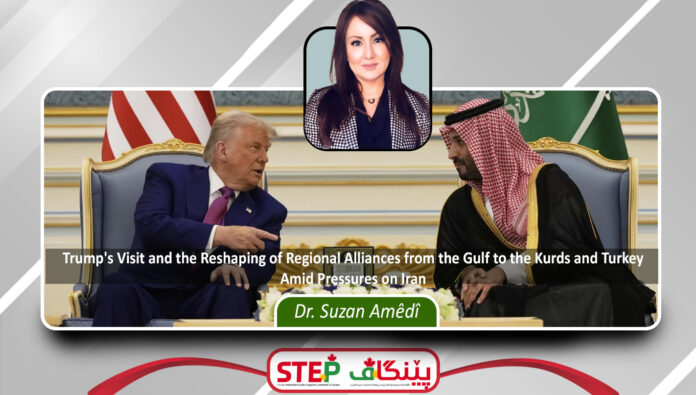Dr. Suzan Amêdî
In his first regional move after returning to the political scene, U.S. President Donald Trump chose Saudi Arabia, Qatar, and the UAE as his initial stops, on a visit that carried both explicit and implicit messages, revealing the contours of a new-old American policy toward the Gulf and the Middle East. Choosing Riyadh as the gateway to the Gulf was no accident; the Kingdom, with its political, religious, and economic weight, represents the cornerstone of traditional American alliances. Amid rapid transformations, Washington seeks to solidify its alliances in a region that has witnessed political and strategic fractures in recent years.
As for Qatar and the UAE, their presence in this tour was not supplementary, but reflected a growing American interest in the stability of the “financial-investment triangle” in the Gulf, especially with announcements of major commitments from Abu Dhabi valued at $1.4 trillion, and from Riyadh at approximately $600 billion. This economic focus that overshadowed the official aspect of the visit does not negate the security dimension, which formed the core of the dialogue between the two parties.
In this context, the Yemen issue emerges, no longer just a regional matter confined to geographic boundaries, but a direct intersection between Washington and Tehran. The United States views the Houthis as an active Iranian arm and a direct threat to international shipping, which opens the door to potential American support for limited military moves aimed at rebalancing power, or perhaps using the Yemen card within a broader regional deal, which could involve unannounced exchanges, such as Saudi-Israeli normalization in exchange for easing or gradually ending the war.
Although the official rhetoric did not explicitly name Iran, the movements and undertones suggested that the visit carried deterrence messages directed at Tehran. Military coordination, expected maneuvers, and advanced arms deals all point to an American effort to encircle Iranian influence regionally. Trump is not seeking an all-out confrontation, but rather adopting a calculated escalation that raises the pressure ceiling before any potential negotiations. What supports this direction is the prominent participation of technology and artificial intelligence companies in the Riyadh forum, reflecting a shift in deterrence tools, establishing a new environment for alliances that transcends the classic military dimension.
At its core, Trump’s visit to the Gulf appears to send the message that “America is back,” but this return is conditional; American support is no longer free, and the partnership is built on investment and mutual interests. While major files such as Yemen and Iran are present on the agenda, they remain, in Washington’s view, tools of negotiation, not final objectives. The Middle East stands on the brink of a new phase of repositioning, not governed by statements but by the language of clear interests, and the Gulf region finds itself once again at the heart of this complex equation.
Although Trump’s visit does not offer direct benefits to the Kurds, its indirect impacts could manifest in several ways. If the escalation of American pressure on Iran leads to a reduction of its influence in Iraq, it could provide the Kurds with greater maneuvering room in their political dealings and restore balance in their relationship with Baghdad. Additionally, Gulf countries, with American encouragement, opening up to Erbil could provide a key opportunity for political and economic support. In the longer term, the Kurds may find themselves with a chance to reposition themselves within a new regional balance, provided they maintain independence and the ability to read transformations wisely.
As for Turkey, the visit may contribute to strengthening security coordination between Turkey and the United States, especially after the PKK announced its self-dissolution and the laying down of arms. Turkey hopes that this phase will lead to tightening the noose on armed Kurdish groups and achieving security gains in northern Iraq and Syria. In return, the reduction in military tensions could pave the way for broader political and economic rapprochement, strengthening the Kurds’ position in Syria and the Kurdistan Region, and opening the door for a more balanced relationship with Ankara, based on shared interests and new regional understandings.

Photo: Alex Brandon/AP—https://www.npr.org/2025/05/13/nx-s1-5395863/trump-saudi-arabia-qatar-uae-business-syria
May 13, 2025





